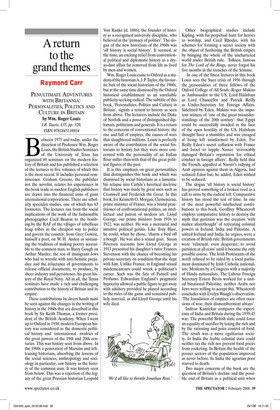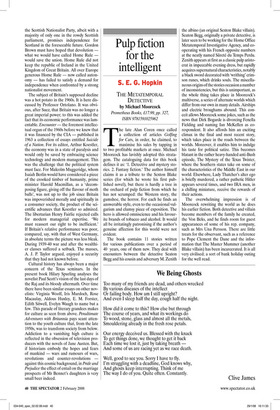A return to the grand themes
Raymond Carr
PENULTIMATE ADVENTURES WITH BRITANNIA: PERSONALITIES, POLITICS AND CULTURE IN BRITAIN by Wm. Roger Louis I.B. Tauris, £35, pp. 320, ISBN 9781845116934 Between 1975 and today, under the direction of Professor Wm. Roger Louis, the British Studies Seminars of the University of Texas has organized 60 seminars on the modern history of Britain and has published a selection of the lectures in five volumes of which this is the most recent. It includes personal reminiscence. Graham Greene, the publisher not the novelist, relates his experiences in the book trade as modest English publishers are drawn into the financial arms of giant international corporations. There are scholarly specialist studies, one of which has 65 footnotes. The lectures run from the social implications of the work of the fashionable photographer Cecil Beaton to the bombing by the RAF of the villages of rebellious Iraqi tribes as the cheapest way to police and govern the country; from Grey Gowrie, himself a poet, on W. H. Auden as sustaining the tradition of making poetry accessible to the common man, to Barry Gough on Arthur Marder, the son of immigrant Jews who had to wrestle with anti-Semitic prejudice and the reluctance of governments to release official documents, to produce, by sheer industry and persistence, his great history of the Royal Navy. All in all, the Texan seminars have made a rich and challenging contribution to the history of Britain and its empire.
These contributions by divers hands must be seen against the changes in the writing of history in the 1960s that are described in this book by Sir Keith Thomas, a former president of the British Academy. When I went up to Oxford in 1938, modern European history was considered as the domestic political history and international rivalries of the great powers of the 19th and 20th centuries. This was history seen from above. In the 1960s a generation of Marxian and leftleaning historians, absorbing the lessons of the social sciences, anthropology and sociology in particular, saw history as the history of the common man. It was history seen from below. This was a rejection of the legacy of the great Prussian historian Leopold Von Ranke (d. 1886), the founder of history as a recognised university discipline, who believed in the ‘primacy of politics’. The slogan of the new historians of the 1960s was ‘all history is social history’. It seemed, at the time, an exciting relief from conventional political and diplomatic history as a dryas-dust affair far removed from life as lived by men and women.
Wm. Roger Louis came to Oxford as a student of the historian A. J. P. Taylor, the favourite butt of the social historians of the 1960s, but at the same time dismissed by the Oxford historical establishment as an unreliable publicity-seeking radical. The subtitle of this book, ‘Personalities, Politics and Culture in Britain’, signals a return to history as seen from above. The lecturers include the Duke of Norfolk and a posse of distinguished diplomats, politicians and generals. It is a return to the concerns of conventional history: the rise and fall of empires, the causes of wars that slaughtered millions. Louis is perfectly aware of the contribution of the social historians to history but they were more concerned with the personality of an Italian flour miller than with that of the great political figures of the past.
It is this emphasis on great personalities that distinguishes this book and which was dismissed by social historians as a lamentable relapse into Carlyle’s heretical doctrine that history was made by great men such as Cromwell and Frederick the Great. In this book, for Kenneth O. Morgan, Clemenceau, prime minister of France, was a brutal practitioner of confrontational politics, an intellectual and patron of modern art. Lloyd George, our prime minister from 1916 to 1922, was neither. He was a mercurial and intuitive political genius. Like Tony Blair, he could, when he chose, ‘charm a bird off a bough’. He was also a sexual goat. Susan Petersen recounts how Lloyd George in 1913 presented his daughter’s tutor Frances Stevenson with the chance of becoming his private secretary on condition that she slept with him. Unlike France, in England sexual misdemeanours could wreck a politician’s career. Such was the fate of Parnell and Profumo. Edwardian England’s pragmatic hypocrisy allowed a public figure to get away with adultery provided he played according to the rules of the game and remained publicly married, as did Lloyd George until his wife died. Other biographical studies include Kipling, with his perpetual hunt for heroes to worship, and Cecil Rhodes, with his schemes for forming a secret society with the object of furthering the British empire by bringing the whole of the unchartered world under British rule. Tolkien, famous for The Lord of the Rings, never forgot his five months in the trenches of the Somme.
In one of the finest lectures in this book Louis sees the Suez crisis of 1956 through the personalities of three fellows of the Oxford College of All Souls: Roger Makins as Ambassador to the US, Lord Hailsham as Lord Chancellor and Patrick Reilly as Under-Secretary for Foreign Affairs. Sidelined by Eden, Makins was the impotent witness of ‘one of the great misunderstandings of the 20th century’: that Egypt could be successfully invaded in the face of the open hostility of the US. Hailsham thought Suez a shambles and was enraged at being left uninformed by Eden. For Reilly Eden’s secret collusion with France and Israel to topple Nasser ‘irrevocably damaged Britain’s reputation for ethical conduct in foreign affairs’. Reilly held that the French, appalled at Nasser’s rallying of Arab opinion against them in Algeria, had seduced Eden but, he added, Eden wished to be seduced.
The slogan ‘all history is social history’ has proved something of a broken reed as a call to arms by the radical left. Comparative history has stood the test of time. In one of the most powerful intellectual contributions to this book, Geoffrey Wheatcroft employs comparative history to destroy the myth that partition was the creation ‘with malice aforethought’ of retreating colonial powers in Ireland, India and Palestine. A united Ireland and India, he argues, were a creation of British rule. British governments were ‘reluctant, even desperate, to avoid partition at all costs’ until it became the only possible course. The Irish Protestants of the north refused to be ruled by a local parliament dominated by Irish Catholic nationalists; Moslems by a Congress with a majority of Hindu nationalists. The Labour Foreign Secretary Ernest Bevin worked for a united binational Palestine: neither Arabs nor Jews were willing to accept this. Wheatcroft concludes with Evelyn Waugh’s observation: ‘The foundation of empires are often occasions of woe; their dismemberment always’.
Indivar Kamtekar compares the experience of India and Britain during the 1939-45 war. The powerful British state could force an equality of sacrifice by taxing the rich and by the rationing and price control of food. The result was a more egalitarian society. In India the feeble colonial state could neither tax the rich nor prevent food prices from rocketing. In Britain the health of the poorer sectors of the population improved as never before. In India the agrarian poor starved to death.
Two major concerns of the book are the question of Britain’s decline and the possible end of Britain as a political unit when the Scottish Nationalist Party, albeit with a majority of only one in the rowdy Scottish parliament, promises independence for Scotland in the foreseeable future. Gordon Brown must have hoped that devolution — what we would have called Home Rule — would save the union. Home Rule did not keep the republic of Ireland in the United Kingdom of Great Britain. All over Europe generous Home Rule — now called autonomy — has failed to satisfy a demand for independence when confronted by a strong nationalist movement.
The subject of Britain’s supposed decline was a hot potato in the 1960s. It is here discussed by Professor Ortolano. It was obvious, after Suez, that Britain was no longer a great imperial power; to this was added the fact that its economic performance was lamentable. Encounter — the foremost intellectual organ of the 1960s before we knew that it was financed by the CIA — published in 1963 a collection of essays entitled Suicide of a Nation. For its editor, Arthur Koestler, the economy was in a state of paralysis and would only be saved by embracing science technology and modern management. This was the challenge that the political system must face. For Malcolm Muggeridge, whom Isaiah Berlin would have considered a piece of the crooked timber of humanity, prime minister Harold Macmillan, as a ‘decomposing figure, giving off the flavour of moth balls’, was not up to the job since Britain was impoverished morally and spiritually in a consumer society, the product of the scientific advances that Koestler so admired. The libertarian Henry Fairlie rejected calls for modern managerial expertise. ‘We must reassert our right to be inefficient.’ If Britain’s relative performance was poor, compared, say, with that of West Germany, in absolute terms the picture was less bleak. During 1939-40 war and after the wealthier classes suffered a setback. The masses, A. J. P. Taylor argued, enjoyed a security that they had not known before.
Cultural history has always been a major concern of the Texas seminars. In the present book Hilary Spurling analyses the novelist Paul Scott’s vision of the last days of the Raj and its bloody aftermath. Over time there have been similar essays on other novelists: Virginia Woolf, Iris Murdoch, Rose Macaulay, Aldous Huxley, E. M. Forster, Edith Sitwell, Evelyn Waugh to name but a few. This parade of literary grandees makes for culture as seen from above. Penultimate Adventures with Britannia pays scant attention to the youth culture that, from the late 1950s, was to transform society from below. Addiction to a vanishing high culture is reflected in the obsession of television producers with the novels of Jane Austen. But, if historians embody the hopes and fears of mankind — wars and rumours of wars, revolutions and counter-revolutions — against this cosmic background, in Pride and Prejudice the effect of entail on the marriage prospects of Mr Bennet’s daughters is very small beer indeed.



































































 Previous page
Previous page